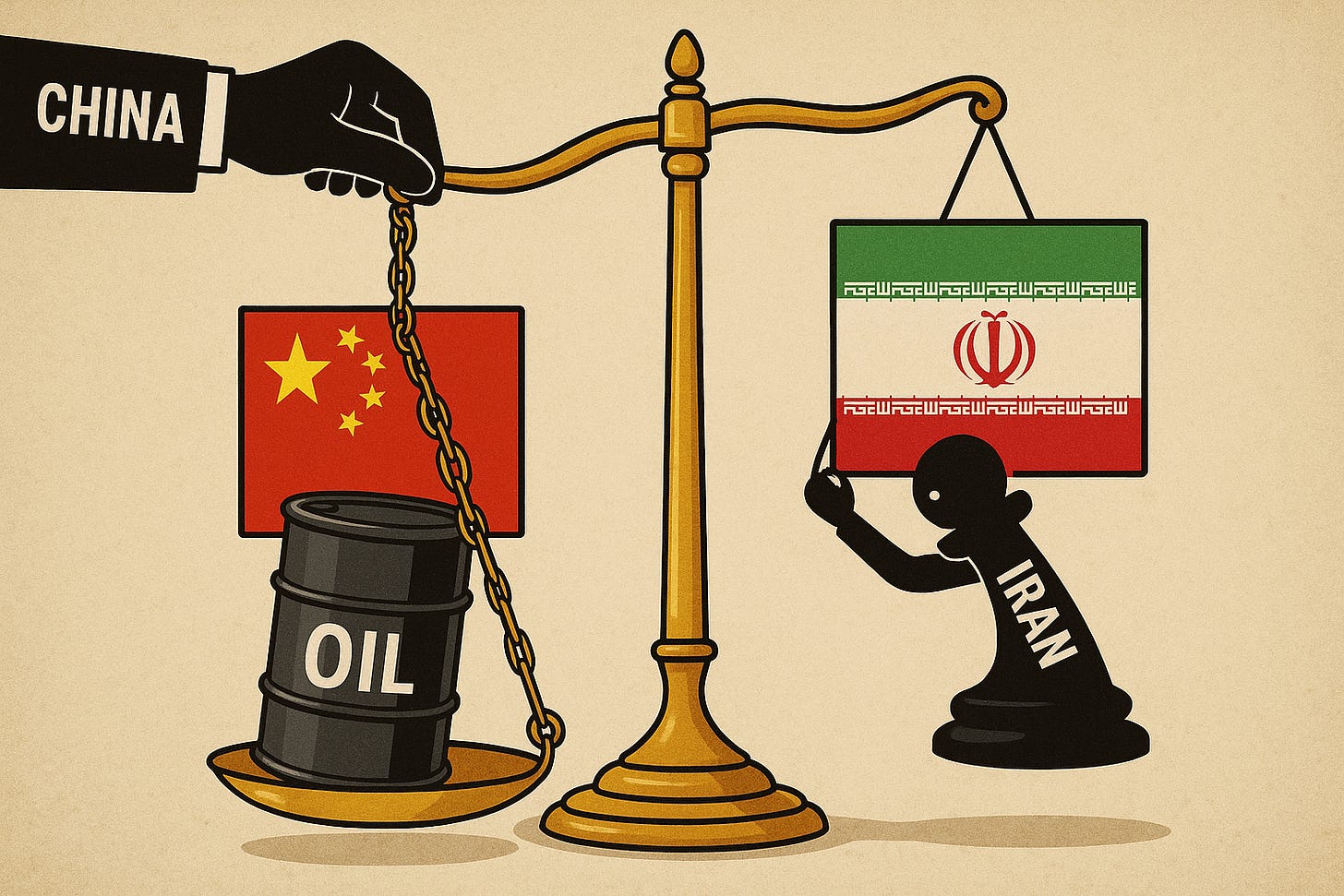We’re still seeing a lot of analysis on China’s response to the Israel-Iran conflict, with a focus on what China didn’t do to support Tehran. The main idea is leverage - that China is by far Iran’s most important economic partner and that should translate into Chinese influence on Iranian behavior. Long-time readers will know I don’t think this works.
On Beijing’s economic importance, there’s no doubt. It’s been Iran’s top trade partner since 2012, and it’s reportedly been buying 90% of Iran’s oil. Without Chinese money, the thinking goes, the Islamic Republic couldn’t function. If China could be convinced to stop buying from Iran, Tehran would be sufficiently weakened and have to come to the bargaining table with those countries that want a compliant Iran. Since those same countries also want a compliant China, Beijing isn’t going to cooperate.
Beijing has proven that it doesn’t especially care about the reputational costs of being seen as Iran’s life support. It continues to do huge trade with the Gulf countries that see Iran as a threat to regional stability. It continues to do relatively huge trade with Israel, despite positioning itself oppositionally to nearly everything Israel wants, says or does. Its SOEs continue to get huge contracts all over the Middle East - North Africa, a region that is supposedly undermined by Iranian aggression.
That China continues to get energy, trade and contracts from MENA is enough. That’s what it wants from the region. Chinese who think about MENA will say, “We didn’t redraw the map of the region, creating weak states that have been competing for a century. We didn’t undermine Iranian politics to support a weak and unpopular shah. We didn’t invade Iraq and shatter a fragile regional order. Why do you expect us to fix a mess that the British, French and US made?”
A not unreasonable response would be that if you a) want to be seen as a responsible global power and b) you want to continue to profit from MENA, you need to contribute to regional security. And again, a Chinese response is that economic engagement and infrastructure construction will ultimately result in more prosperous and stable countries.
I think the limits of “peace through development” are clear right now. With immediate security threats, wars, and constant tensions from non-state actors, economic solutions aren’t nearly enough. But it’s also clear that China isn’t willing to go further. I suspect they would agree with Colin Powell’s ‘Pottery Barn’ theory of Middle East interventions: “You broke it, you buy it.”
Chinese leaders have consistently articulated their core interests. Its 2011 white paper, “China’s Peaceful Development,” lists them for us: state sovereignty, national security, territorial integrity, national reunification, maintenance of its political system and social stability, and maintaining safeguards for sustainable economic and social development. There is literally nothing in there that is significantly or directly impacted by anything that happens in the Middle East. China is getting exactly as much as it wants and needs from MENA as it is, and I don’t think we should expect a more forceful regional presence as long as that’s the case.
Getting back to Iran, I’ve written and said this in many places over the past few years so apologies if you’ve already heard this from me. There are times when leaders in Iran are receptive to China’s economic largess. After the JCPOA was signed and Iran saw potential to be a “normal” country, the idea of Chinese companies investing in infrastructure and developing gas fields was useful. Chinese could use this as leverage.
However, since October 7 2023, Iran hasn’t needed infrastructure; it’s needed air support. And China is not willing to be that kind of partner to an isolated and diminishing regional power. Iran knows that China isn’t going to provide the support they need.
So what leverage does China really have when Iran is facing an existential threat and Beijng isn’t answering the phone? The answer is ‘almost no leverage.’
I think at this point China will do just enough to build up Iran’s value as a trade chip for negotiating with the US on issues of more importance to Beijing, primarily tensions in their bilateral economic relationships. The perception of influence in Iran can be useful, so I wouldn’t expect Beijing to abandon Tehran, but I also wouldn’t expect to see meaningful support. As such, I wouldn’t expect to see any kind of political influence, at least the kind that Israel and the US are looking for.
On a completely different note, today is Book Day! My latest book, Building the Belt and Road Initiative in the Arab World: China’s Middle East, is out today. You can buy copies for several loved ones and casual acquaintances at all the usual venues.




